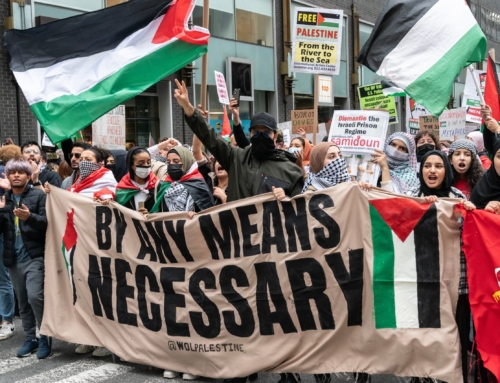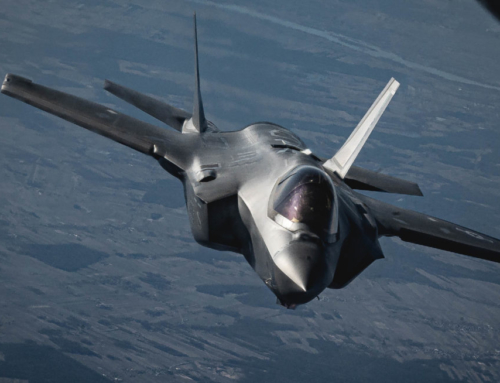Osama bin Laden has been gone for about a month now, bringing forth a plethora of experts analyzing exactly what his death means to the greater conflict against radical Islam. On the one side are the doomsayers who stridently screech that his death did nothing but inflame the Muslim world, sparking the creation of a legion of new terrorists. On the other side are predictions of the demise of Al Qaida and the subsequent fragmenting of bin Laden’s bankrupt nihilistic vision because of the onslaught of the Arab Spring.
While it’s ultimately unclear how great the impact will be, there is no doubt that bin Laden’s death will adversely affect al Qaida. His charisma drove the group’s creation, and was a beacon call for Jihad. Because of al Qaida’s success on 9/11, along with Osama bin Laden’s ability to evade the mighty United States, other terrorist groups threw away the names they had fought under for years and picked up the al Qaida slogan – such as the GSPC in Algeria which became al Qaida in the Maghreb in 2006. Bin Laden’s death has dealt al Qaida a huge blow, with the loss of a god-like icon that engendered the recruiting of both soldiers and money.
In the end, there will be an effect, but his removal alone isn’t enough to destroy radical Islam. Clearly, the root causes that lead someone to embark on this path need to be addressed as well. Economic stagnation, corrupt, brutal governments, and a lack of hope have all been described as the swamp that must be drained to stop people from turning to the global jihad, and in truth, that’s exactly what must occur in the long-term. In the short term, all that is needed is an alternative to al Qaida; some other outlet besides Jihad. Fortunately, the Arab Spring we’re now seeing has the potential to provide that outlet.
The uprisings in the Middle East—in Tunisia, Egypt, Syria, Libya and a host of other places – are a direct confrontation to al Qaida’s core doctrine. Bin Laden stated that the Islamic world must first attack the “Far Enemy” of the west before attacking the “Near Enemy” of the middle-eastern regimes. The chain reaction of the Arab Spring has short circuited that doctrine, showing that it is well within the capability of the people to take the fight to the near enemy all by themselves, without following some radical Islamic Jihadi. There will be no way to quantify in statistics, but I can’t help but wonder about the numbers of people who would have been on the road to Jihad, but are instead participating in the Arab Spring. Bin Laden’s death, coupled with the Arab Spring, make al Qaida’s recruiting prospects look much, much worse than they did only four months ago. The effect won’t be instantaneous, but it will be real.
As I reflected on the current situation in the Middle East, I was struck by the fact that it was bin Laden himself that started the domino effect that led to the current revolts and protests. Most people attribute the beginnings of the Arab Spring to the cart-vendor who immolated himself in Tunis, Tunisia, on 17 DEC 2010. That was certainly a large link in the chain, but the first shot was fired in Lebanon in 2005.
On March 14th 2005, the former Prime Minister of Lebanon, Rafiq Hariri, was assassinated by a car bomb, most likely by Syrian and Hezbollah elements. The act brought on an incredible response from the Lebanese population, complete with the now ubiquitous enormous rallies. The primary demand was the removal of Syrian occupation forces and the subsequent withdrawal from Lebanese politics, something Syria had been manipulating for decades. Within months, Syria relented, and pulled it’s troops home, bringing about the first salvo of the now famous Arab Spring. But why did Assad order his troops to leave? After all, the strongest armed bloc in Lebanon, stronger than even the Lebanese Armed Forces, was (and is) the terrorist group Hezbollah – which was (is) Syria’s ally. In the past, Syria had crushed any such uprising with overwhelming force, such as Hama in 1982, where upwards of 20,000 civilians were killed. Was it really just because people had taken to the streets? What had changed?
In a word: Iraq. Assad had recently watched the United States invade and dismantle Saddam Hussein’s government, had heard President Bush’s martial speeches, and was afraid that he would be next on the list if he did anything heinous. “I am not Saddam Hussein,” Bashar al-Assad said before ordering his troops to withdraw. “I want to cooperate.” ***
My purpose here isn’t to start a debate on Iraq. You can feel however you like about that conflict, and you’d probably be surprised in my views, but regardless of what has occurred there, it did spark the Arab Spring. Walid Jumblatt himself – the leader of the Lebanese Druze – said, “it’s strange for me to say it, but this process of change has started because of the American invasion of Iraq. I was cynical about Iraq. But when the Iraqi people voted three weeks ago, eight million of them, it was the start of a new Arab world. The Syrian people, the Egyptian people, all say that something is changing. The Berlin Wall has fallen.” Very prescient considering it was said in 2005.
But what led to the invasion of Iraq? I’m not talking about WMD or other tactical considerations. What led to the invasion in the first place? Well, clearly, it was 9/11. If bin Laden hadn’t attacked us, the dominoes would not have led to Iraq. And to the Arab Spring. The very attack that was supposed to bring the United States to its knees may quite possibly end up crippling al Qaida instead.
Don’t get me wrong. I’m not implying the Arab Spring is a panacea that will cure the world of radical Islam. They are a thinking enemy, and are not stagnate. Worst case, they co-opt the revolutions and get the Islamic caliphate they’re striving for, much like happened in Iran in 1979 and is currently happening in Lebanon with Hezbollah, and which I fear could happen in both Yemen and Libya. Even without interference by radical Islam, in the end the Arab Spring is nothing more than an outlet for something better. It’s not something better in and of itself. If, after time, the people in those countries are no better off than when they were under the hands of a dictator – if the swamp isn’t drained – they’ll once again look for an outlet, only this time they’ll have tried democracy and popular uprising. Maybe next time they’ll turn to radical Islam.
Even with these risks, the Arab Spring could potentially reap great rewards for the region and the world. At the very least, in the short-term, it’s a heavy blow to al Qaida, both in recruiting and in legitimacy. With the death of bin Laden, that blow will be felt all the more. I hope he’s punching himself in the belly of a shark for pushing that domino in the first place.
***The quote from Bashar al Assad is taken from: The Road to Fatima Gate, Michael J. Totten, Pg 209-210










Thanks for the insight. I check daily and was pleasantly surprised to see an entry today.
Also, I am ever so impressed to know someone who can use “nihilistic” in a sentence! 😉
I always come away from reading your blog with a broader cognate view of Muslim politics. Is it possible for a people who have lived under religious ternary for hundreds of years to overcome their oppressors? Thanks, once again for your insights.
I am not so sure we truly invaded Iraq because of 9/11. It also was not the WMD IMO. I fear it was all driven by oil. I believe that most of what we do in the middle east is driven by the oil interests of a few. I am slowly coming to the conclusion that we need to spend more time beefing up our southern boarder with Mexico than in trying to solve the problems of every two bit country. We have a debt that will eventually bankrupt this country if something is not done soon. And pulling back somewhat and putting our troops to use doing something that will directly benefit this great country may be part of the answer. Sorry, didn’t mean to start a rant.
Hugh campbell is right war on Iraq was only for oil not for anything else, i’am an arabian and i will admit something, i’ll admit that all the arab community is so DAMN STUPID, Stupid that they even can’t understand what’s there religion is, and what even told us about you christians, what I mean is that al qaida is one of two things:
1- they take the Islamic religion as a cover for thier crimes.
2- they are f.u.c.k.i.n.g Idiots.
I know what is islam and what is jihad there is nothing in our religion says that we can kill people who aren’t harming any of our people or religion.
I hope all of the mighty americans understand what is Islam before they just talk about it ” Like some people I don’t want to mention.
Wow. If I’m the one you “don’t want to mention”, I don’t know why. I said the same thing you’re saying about al Qaida in this blog I posted on October 6, 2010 called American Islamophobia. If more Muslims would stand up like you did on this comment, there would be no al Qaida.
Although I disagree with the “Iraq for oil” statement, and I’m unclear what you mean about “you christians”, since you don’t know anything about my religion or whether I even have one, I completely agree on your assessment of the current state of the understanding of Islam. Most of the misunderstanding stems from the fact that there aren’t enough Muslims saying 1) al Qaida is a bunch of “f.u.c.k.i.n.g idiots” and 2) they are taking the “Islamic religion as cover for their crimes.”
You’re a good start.